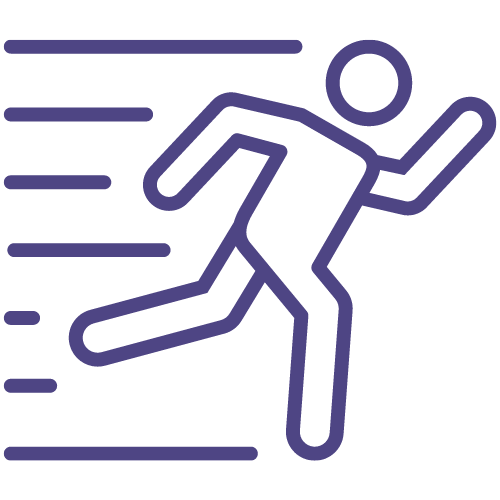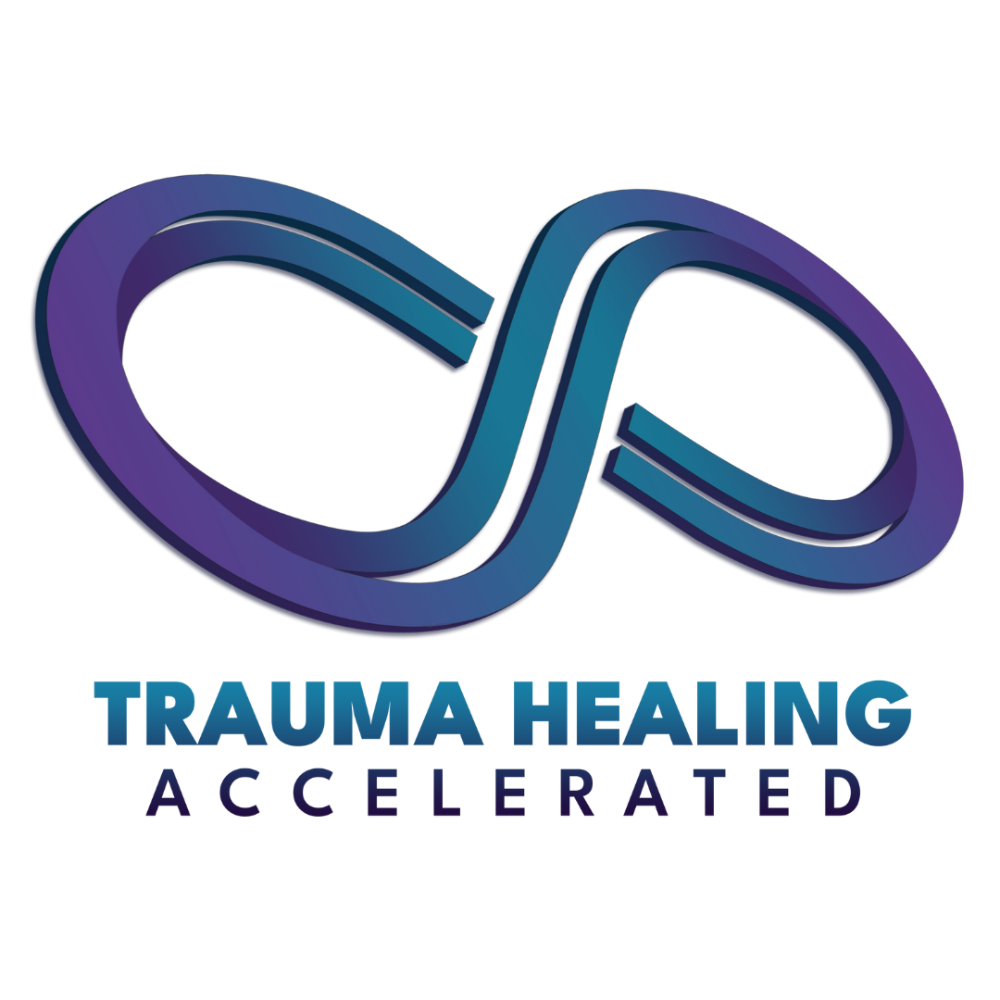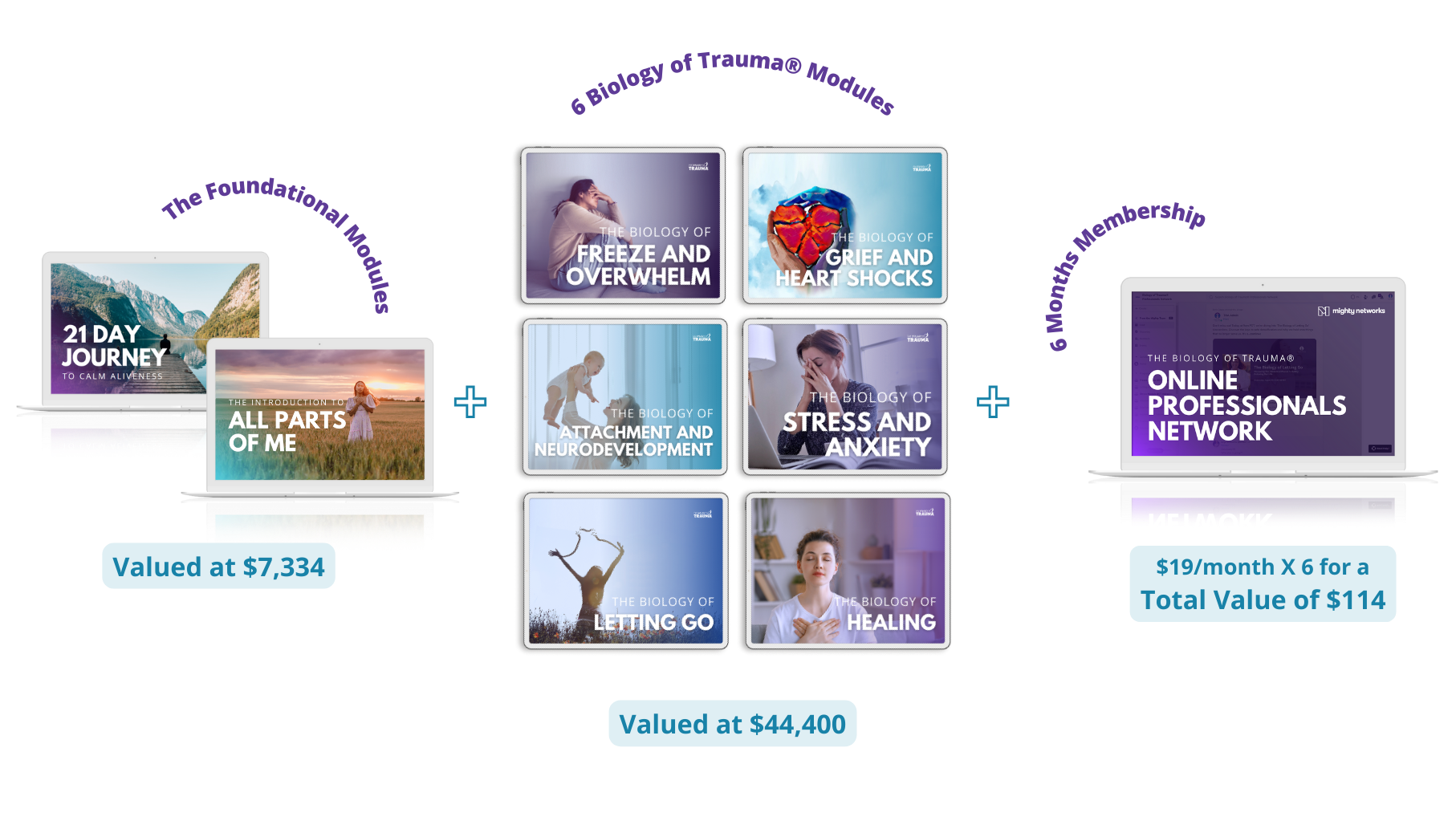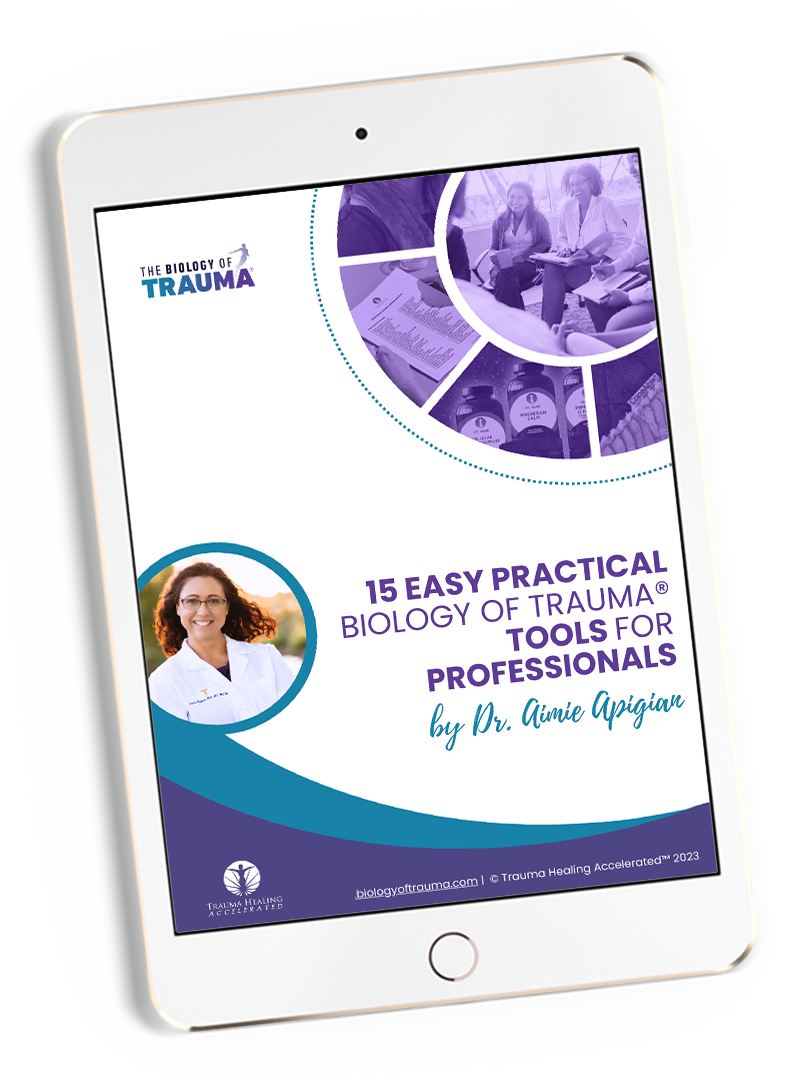What does it mean to become a Biology of Trauma® Professional?
A Biology of Trauma® Professional is trained to address all 3 essential pillars of somatic, parts and biology work to bring clients lasting freedom from stored trauma. Professionals are trained in identifying which nervous system state a client is in in order to take the most effective approach to bringing the client to a regulated state, and to their best health and best selves. Professionals receive training in holistically applying the latest in neuroscience, epigenetics, attachment theory and more. Because Biology of Trauma® Professionals understand that healing begins with themselves, they walk through all of the exercises and trainings for themselves first in order to be their most well-resourced selves for clients and to better guide clients through their own holistic, healing work.
The 3 Guiding Principles of Treating a Biology of Trauma®
1. Treating trauma needs to be PRACTICAL, implementable, and not overwhelming.
2. The second principle is that it has to be PERSONALIZED. Cookie-cutter medicine does not work for the Biology of Trauma®. Clients need a personalized and bio-individualized evaluation and plan.
3. The third principle is that treatments have to be emPOWERING. We have to teach people how to track and shift their own nervous system in the ways that work best for them.


Understand the difference between Stress and Trauma in the body.
Learn to recognize signs of stress vs trauma in the body so you can apply the right tools! You’ll gain tools in essential functional medicine, neuro-optimization, somatic exercises, parts work and more to accelerate your clients’ movement out of chronic stress or trauma and on with their lives.
The Biology of Trauma® Professional Training Modules
The Foundational Module:
21 Day Journey + Introduction to All Parts of Me
Your path to becoming a Biology of Trauma® Professional begins with a guided, experiential 21 Day Journey into your own nervous system. Discover how to recognize the difference between stress and trauma in your own body and what your body needs in each state to return to feeling safe and supported.

In the 3-week Introduction to All Parts of Me course, you will learn how to identify and communicate gently with your unique parts. Come to understand your triggers and why you do what you do, as well as how to get to the heart of what you really want, so you can give that to yourself.
Experiencing these somatic and parts processes for yourself will help you better walk clients through these essential steps to support and rewire their own nervous systems and to live connected to their authentic core.
The 6 Modules to Become a Biology Of Trauma® Professional
While it is recommended to take Modules in the order listed below, professional training can be done in any order.
The Biology of Freeze and Overwhelm
A 6-week journey into the biology of the freeze response bringing in the healing factors of safety, time, and energy on a cellular level by addressing mitochondrial health, brain inflammation and autoimmunity.
The Biology of Grief and Heart Shocks
The next stage of the healing journey after the freeze response, a 6-week journey into the biology of grief that can keep us stuck in a trauma response by bringing in the healing factors of titration and gut health.
The Biology of Attachment and Neurodevelopment
A 6-week journey into early attachment and neurodevelopment, the biology that predisposes one to attachment trauma and tools to rewire and program ourselves for safety and security on a cellular level.
The Biology of Stress & Anxiety
Coming out of a freeze response, a 6-week journey into strengthening a healthy stress response and maintaining our cellular resources to allow us to stand and take action in the problems in our life.
The Biology of Letting Go
A 6-week journey into The Biology of Letting Go, the last stage of the trauma healing journey that will keep us stuck in holding on to toxins, weight, inflammation and resentments.
The Biology of Healing
A 6-week journey into the integrated approach to implementing the right tools at the right time to move clients through their unique biology of trauma to the vibrant health, aliveness and connected relationships that await them on the other side.
All modules in the Biology of Trauma® Professional Training Program work
together to:
- Help you identify & address the biological factors at play in your clients’ experience of stored trauma
- Transform you into a next-level, holistic provider in addressing the underlying trauma affecting the physical, emotional and mental health of your clients
- Give you practical tools to accelerate your and your client's trauma healing
- Increase your expertise and training in trauma-informed work


Who is the Biology of Trauma® Certificate Course for?
"I wish every single one of my patients was taking this course...
I've seen what's holding me back from being a better physician, a better provider, but also a better husband, father, grandfather. I have tools to really retrain my neurological system, deal with trauma, and deal with life. It's life-changing!"
-Dr. Drew Christiansen
Founder of the Shake-Free Initiative for Essential Tremors
The Value & Cost of Each of The
6 Professional Training Modules

6-Week Comprehensive Journey










Frequently Asked Questions
What is the Biology of Trauma® Professional Training?
What does the training involve?
Can you tell me more about each of the Modules?
Are classes online and recorded?
How many hours a week do I need to dedicate to this training?
How do I receive the certificate?
What professionals are eligible for this training?
Does it matter in which order I complete the Modules?
Does completing this training program give me special credentials or licensing?
Is the Professional Certificate the most advanced training offered for professionals?
What is your refund policy?
Your Biology of Trauma® Instructor,
Dr. Aimie Apigian
Dr. Aimie is a double Board-Certified medical physician who specializes in trauma, attachment, addictions and addressing trauma on a cellular level. She earned her medical degree at Loma Linda University and has a Masters in Biochemistry as well as a Masters in Public Health. She trained for three years as a general surgeon before changing her career path.
In addition to her medical studies, Dr. Aimie has studied with and participated in Dr. Allan Schore’s Attachment Regulation Theory Study Group. She is a highly-trained somatic experiencing practitioner, trained in NeuroAffective Touch™, Internal Family Systems (Parts Work) and the Instinctual Trauma Response Model™. She continues to attend advanced trainings in Somatic Experiencing™ with Dr. Peter Levine and acts as an editor for Somatic Experiencing International.
She is not one to sit back and talk about problems. She is a solution-focused action taker- always looking for ways to improve our current method and accelerate the healing journey back to our best health and our best selves.


Disclaimer: This is not a course that gives you a license as a provider nor is it a health or trauma recovery coach credentialing program. At the completion of each module, you will receive a Certificate of Completion indicating you have achieved competency on that specific topic of Biology of Trauma®. At the completion of all 6 modules of the Certificate Course, you will receive a certification as a Biology of Trauma® Professional from Trauma Healing Accelerated. This is a certification that you will be adding to your professional work capacities.
You are still held to the restrictions, responsibilities and privileges of your primary license and board.
Medical Disclosure: The information and programs presented on or through this website are made available to equip you with knowledge and tools. All the materials in this course are intended for educational purposes. This information nor any programs that are offered are (nor are a substitute for) medical advice, diagnosis, or treatment. For any physical or mental health issues, I recommend you work with a qualified health provider who will also support your desire to address the effects of trauma.













